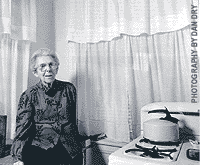Ten
Chicagoans master the art of growing older
 Hortense
Friedman, 98
On a chilly autumn afternoon, Hortense Friedman, PhB'22,
heats water for tea on the Universal stove she's used since moving
into her Evanston apartment in 1953. A financial officer at the
University for more than 40 years, she still reads the Wall
Street Journal "pretty thoroughly every day." She has set the
day's edition on her coffee table next to a photo album chronicling
a July 1937 pack trip along the Sierra Nevada Mountains' John
Muir Trail. It's one of the many camping and riding trips Friedman
took for her vacations.
Hortense
Friedman, 98
On a chilly autumn afternoon, Hortense Friedman, PhB'22,
heats water for tea on the Universal stove she's used since moving
into her Evanston apartment in 1953. A financial officer at the
University for more than 40 years, she still reads the Wall
Street Journal "pretty thoroughly every day." She has set the
day's edition on her coffee table next to a photo album chronicling
a July 1937 pack trip along the Sierra Nevada Mountains' John
Muir Trail. It's one of the many camping and riding trips Friedman
took for her vacations.
 "After
graduating from the University of Chicago, I tried to get jobs
in business and couldn't. Women had to be a nurse or a stenographer.
After I mastered Gregg shorthand, I became secretary to the University's
assistant business manager, George O. Fairweather [SB'06, JD'09].
After one year as secretary, I started playing with investment
analysis. Instead of firing me, they put me in a private office
and said, 'Go do it.' They set me on the endowment list, checking
up on individual securities.
"After
graduating from the University of Chicago, I tried to get jobs
in business and couldn't. Women had to be a nurse or a stenographer.
After I mastered Gregg shorthand, I became secretary to the University's
assistant business manager, George O. Fairweather [SB'06, JD'09].
After one year as secretary, I started playing with investment
analysis. Instead of firing me, they put me in a private office
and said, 'Go do it.' They set me on the endowment list, checking
up on individual securities.
"In
'38 they made me assistant treasurer. It was that way for another
three decades. We branched out into high--yielding, unconventional
endowment investments, like an oil tanker that we bought hook,
line, and sinker. We also had an interest in one company in Denver
that was making parts for traffic signals just when the national
highway system was in the making.
"President
Hutchins wanted younger treasurers more willing to reach for higher
endowment income. He wanted that income pretty intensely. There
were always interesting things to examine and select. I retired
in January 1969. I worry now that I've been existing on a University
pension for much longer than anyone would have expected!
"It
was comfortable to work very hard at my salary, which was not
competitive with business salaries, for something I believed in.
I was willing to give a lot of my time and energy in excess of
what was required because I believed in the University. I liked
what I was working to accomplish, that it wasn't for some stockholder's
profit. And the working atmosphere at the University was different
from that of some of the legal and advertising offices around
town that were always having rowdy parties. The University was
a mannerly place.
"My
advice is to buy stocks to stay a holder, not for a quick profit.
Enjoy ownership and pay attention. Sell when it no longer seems
to have promise."





![]()
![]()
 Hortense
Friedman, 98
On a chilly autumn afternoon, Hortense Friedman, PhB'22,
heats water for tea on the Universal stove she's used since moving
into her Evanston apartment in 1953. A financial officer at the
University for more than 40 years, she still reads the Wall
Street Journal "pretty thoroughly every day." She has set the
day's edition on her coffee table next to a photo album chronicling
a July 1937 pack trip along the Sierra Nevada Mountains' John
Muir Trail. It's one of the many camping and riding trips Friedman
took for her vacations.
Hortense
Friedman, 98
On a chilly autumn afternoon, Hortense Friedman, PhB'22,
heats water for tea on the Universal stove she's used since moving
into her Evanston apartment in 1953. A financial officer at the
University for more than 40 years, she still reads the Wall
Street Journal "pretty thoroughly every day." She has set the
day's edition on her coffee table next to a photo album chronicling
a July 1937 pack trip along the Sierra Nevada Mountains' John
Muir Trail. It's one of the many camping and riding trips Friedman
took for her vacations.  "After
graduating from the University of Chicago, I tried to get jobs
in business and couldn't. Women had to be a nurse or a stenographer.
After I mastered Gregg shorthand, I became secretary to the University's
assistant business manager, George O. Fairweather [SB'06, JD'09].
After one year as secretary, I started playing with investment
analysis. Instead of firing me, they put me in a private office
and said, 'Go do it.' They set me on the endowment list, checking
up on individual securities.
"After
graduating from the University of Chicago, I tried to get jobs
in business and couldn't. Women had to be a nurse or a stenographer.
After I mastered Gregg shorthand, I became secretary to the University's
assistant business manager, George O. Fairweather [SB'06, JD'09].
After one year as secretary, I started playing with investment
analysis. Instead of firing me, they put me in a private office
and said, 'Go do it.' They set me on the endowment list, checking
up on individual securities.